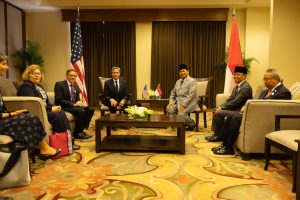On Tuesday, Indonesia’s President-elect Prabowo Subianto met with the U.S. Secretary of State Antony Blinken, during which the pair discussed efforts to establish a lasting ceasefire in the Gaza Strip.
According to a report from BenarNews, which quoted a press release from the Indonesian Ministry of Defense, Prabowo told the secretary of state that Indonesia welcomed the adoption on Monday of the U.N. Security Council Resolution proposed by U.S. President Joe Biden.
During the meeting, Prabowo also expressed Indonesia’s readiness to cooperate with countries currently seeking mediation between Palestine and Israel. He said that Indonesia was ready to work with the U.S., Egypt, and Qatar “to ensure negotiations continue and realize a permanent ceasefire in Palestine.” He added that “an immediate, full, and comprehensive ceasefire is essential to revive the peace process,” according to the Indonesian news agency Antara.
In a short readout from the U.S. State Department, Blinken “thanked the Defense Minister for Indonesia’s support for the proposal to achieve an immediate ceasefire in Gaza and secure the release of all hostages.”
During his speech at the annual Shangri-La Dialogue in Singapore on June 1, Prabowo said that U.S. President Joe Biden’s recent proposal for a ceasefire in Gaza was a “step in the right direction,” and that Indonesia would “do whatever we can to provide humanitarian assistance.” He also offered to send peacekeepers to supervise any political settlement that might emerge in the coming months.
Prabowo’s intervention in the Gaza crisis reflects his intention to play an active role after he assumes office in October. Since winning a decisive victory in the presidential election in February, the defense minister has taken a number of high-profile foreign trips, including to Japan, China, and Malaysia. He also visited Singapore, where he met with Prime Minister Lawrence Wong and addressed the Shangri-La Dialogue security forum earlier this month.
This is somewhat unusual; no past Indonesian president-elect has made formal overseas visits prior to taking office. But Prabowo’s status as defense minister has given him the opportunity to meet and greet the leaders with whom he will work once he assumes office in October.
Prabowo’s meeting with Blinken came after he addressed an international conference in the Jordanian capital on the Gaza crisis, during which he stated that “the government and people of Indonesia fully support Palestinian independence as a real solution to the conflict in Gaza.”
In his speech – the full text in Bahasa Indonesia is available here – Prabowo was less compromising, criticizing unnamed nations that claim to uphold international norms but commit “violations of international humanitarian law by targeting civilians and civilian infrastructure.”
“We call on all major countries to use their significant influence to uphold international law,” he added. “The humanitarian disaster unfolding before our eyes must be addressed immediately.”
If Prabowo is seeking a more active role in foreign affairs than his predecessor Joko Widodo, the Israel-Palestine issue makes sense. The current suffering of Gazans, and the plight of the Palestinian people more generally, are a subject of passionate focus in Indonesia, which has long been outspoken in its support for Palestinian cause and condemnation of Israel.
At the same time, Prabowo’s talks with Blinken, and recent comments at the Shangri-La Dialogue, seem to suggest that he is attempting to move beyond criticism and play a more constructive role in the resolution of the conflict.
Whether he can do so without transgressing the boundaries of acceptable domestic political debate around the Israel-Palestine question in Indonesia remains to be seen. Either way, Prabowo’s involvement in the issue suggests that his administration will mark the start of a new and more active Indonesian presence on the global stage.

































